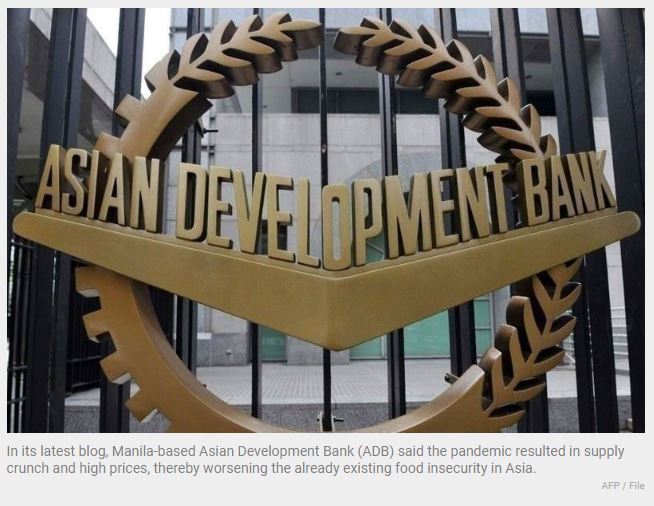Philippines: ADB sees prolonged pandemic impact on food security
MANILA, Philippines — The impact of COVID-19 on food security in the Philippines and in the region is expected to last beyond the pandemic, which should prompt economies to immediately come up with solutions to avoid long-term damage.
In its latest blog, Manila-based Asian Development Bank (ADB) said the pandemic resulted in supply crunch and high prices, thereby worsening the already existing food insecurity in Asia.
It is estimated that the number of people experiencing severe food insecurity globally rose to 928 million, representing 12 percent of the population. Women, children and the poor were the most affected.
ADB economists Manisha Pradhananga, Matteo Lanzafame and Irfan Qureshi emphasized it is still unclear whether the economic recovery this year would actually translate to a decline in food insecurity.
“What we know is that COVID-19 has exacerbated food insecurity in the region, which may have lasting impacts in 2021 and beyond,” they said.
While inequality is clear across the income strata, the ADB experts noted that new fault lines have emerged as well.
For one, urban centers have been more severely affected because of higher population density, a disproportionately larger share of COVID-19 cases and outbreaks, and stricter restrictions on movement.
This is particularly true in Metro Manila being the hotspot of COVID-19 cases. The capital suffered repeated lockdowns due to a sharp rise in cases.
Last year, the hunger rate in Metro Manila was at a record-high 23.3 percent, meaning one out of four residents in the capital experienced hunger.
This compares to the 15 percent in other areas in the country with looser restrictions amid lower COVID-19 cases.
“Among the worst affected have been the urban poor, who largely rely on insecure jobs in the informal sector and spend a substantial portion of their income on food,” the ADB economists said.
In the short term, ADB said it is critical to protect the most vulnerable members of society through food assistance and other social transfers.
In the Philippines, the Department of Social Welfare and Development distributed food packs as part of a program aimed at the poor, people with disabilities, and the elderly living in hard-to-reach areas or far from food retail stores.
Many other Asian economies are also implementing food assistance programs, which may require active fiscal adjustments in several regional economies.
“The pandemic also highlights the importance of building capacity to face food-security challenges in the medium to long-term. A proactive response is especially needed in the context of climate change and the expected rise in the frequency and scale of extreme weather events,” they said.
Further, the multilateral lender maintained that policy actions should focus on building resilient food systems and farming livelihoods by helping farmers prevent, prepare and adapt to weather shocks more effectively.
The ADB economists called on governments to invest in early warning systems that can help farmers anticipate extreme weather events and plan accordingly.
“Food security issues are tied to agricultural policies. To provide nutritious food that is affordable for all, agriculture policy in the region will need to promote productivity growth while ensuring environmental sustainability,” they said.
Source: https://www.philstar.com/business/2021/12/20/2148958/adb-sees-prolonged-pandemic-impact-food-security


 Thailand
Thailand




